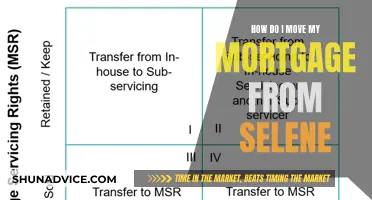
Paying off your mortgage is a significant milestone, but it's important to remember that there are a few additional steps you need to take to finalise your homeownership status. It's essential to obtain the necessary documents, such as a mortgage release document, to confirm that you've fulfilled your financial obligations. You'll also need to update your homeowners insurance policy and continue paying property taxes. Understanding the pros and cons of paying off your mortgage is crucial, as it can affect your credit score and overall financial picture.
| Characteristics | Values |
|---|---|
| Full legal ownership of the property | Yes |
| Monthly loan payments to lender | No longer required |
| Home insurance premiums and property taxes | Paid out of pocket |
| Paperwork from the lender | Confirming final payment and releasing mortgage obligation |
| Canceled promissory note | Marked as 'paid' |
| Loan payoff letter | Verifying full payment |
| Deed of reconveyance | Confirming lender no longer has a legal interest in the property |
| Escrow funds | Returned to the borrower |
| Property deed | Proof of sole ownership |
| Certificate of satisfaction | Issued by local recorder or county clerk |
| Homeowners insurance policy | Needs to be updated |
| Budget and financial goals | Need to be reassessed |
| Lien release | Received from the lender |
What You'll Learn

Receive confirmation from your lender
Once you've paid off your mortgage, your lender or loan servicer will send you paperwork confirming that you've fulfilled your final payment toward the loan and releasing your mortgage obligation. This confirmation will be in the form of several documents, including:
- A cancelled promissory note: This is a document you would have signed at closing, promising to pay back the amount of your mortgage. The lender will return this to you with a "paid" mark.
- A mortgage release document: This signifies that the loan has been fully repaid and the lender no longer holds a claim on the property.
- A statement confirming loan closure: This will be a formal statement from the lender confirming that the loan has been closed.
- A deed of reconveyance: This is a lien release, confirming that your mortgage company no longer has a legal interest in your property.
- Escrow funds: If there is money left in your escrow account, your lender should send you a check or direct deposit for those funds.
- A property deed: This document proves that you are the sole owner of the property.
- A certificate of satisfaction: Issued by your local recorder or county clerk, this document confirms that you've paid off the loan on your property.
Keep in mind that the exact documents you receive may vary depending on your lender. It's important to securely store these documents in a safe place, such as a safe or a safe deposit box, once you receive them.
Making Mortgage Payments: Wells Fargo Guide
You may want to see also

Close your escrow account
Closing your escrow account is a significant step in the process of paying off your mortgage. An escrow account is a third-party service that holds money to cover your property taxes, homeowners' insurance, and, in some cases, private mortgage insurance and homeowners' association dues. These payments are made in addition to your monthly mortgage payments.
Once your mortgage is paid off, there may be a remaining balance in your escrow account. Legally, the lender or servicer must issue a refund of this balance to you within 20 days of closing the account, although this process can sometimes take up to 30 days. The refund can be issued as a check or direct deposit. After receiving the refund, you are responsible for paying your property taxes and insurance premiums directly.
It is important to note that failure to pay property taxes and insurance on time can result in penalties, a drop in your credit score, or even a tax lien on your home. Therefore, you should make arrangements to receive these bills directly and set up a system to ensure timely payments. Additionally, consider updating your homeowners insurance policy by removing the mortgagee clause, which previously entitled the mortgage company to reimbursement in case of damage to the property.
While closing your escrow account provides more flexibility and control over your finances, it also comes with the responsibility of managing larger, lump-sum payments for property taxes and insurance. Without the cushion provided by the escrow account, you will need to budget accordingly to avoid late or missed payments, which can lead to significant penalties and fees.
Making Overpayments on Your Barclays Mortgage: A Guide
You may want to see also

Update your homeowners insurance
Paying off your mortgage is a huge milestone, but it's important to remember that you'll still need to cover some home-related expenses, such as homeowners insurance and property taxes. While it is not mandatory to maintain homeowners insurance after paying off your mortgage, it is highly recommended to protect yourself financially in case of any damage or liability issues.
Contact Your Insurance Company
Get in touch with your homeowners insurance company to inform them that you have finished paying off your mortgage. This is important because, previously, your lender was entitled to payment if you filed a claim. Now that your mortgage is paid off, your lender is no longer entitled to any funds from insurance payouts. Ask your insurance agent or broker to guide you through the process and help you with any necessary updates or modifications to your policy.
Review Your Coverage
It is a good idea to periodically review your homeowners insurance policy to ensure it meets your needs and budget. Consider factors such as the age of your home, the area you live in, and the level of coverage you require. For example, if you live in an area prone to natural disasters or extreme weather, you may want to maintain or increase your coverage. On the other hand, if your home is older and has pre-existing issues, you might want to explore other insurance options.
Update Payment Arrangements
Previously, you likely paid your lender a monthly fee that included separate amounts for your mortgage, homeowners insurance, and property taxes. Now, you will need to make separate arrangements for your insurance payments. You may choose to receive bills from your insurance company each month and pay them by check, or you can set up autopay for added convenience.
Remove Lender's Name from Policy
Make sure to specifically request that your insurance company removes your lender's name from your policy. Even though your lender previously required insurance to protect their financial interest in the property, their name should be taken off the policy now that the mortgage is paid off. This ensures that they are no longer considered a payee or lien holder and will not be involved in any future insurance claims or payouts.
Making Mortgage Overpayments: A Guide to Getting Started
You may want to see also

Receive your original note
When you've finished paying off your mortgage, one of the final steps in the process is receiving your original note. Here's what you need to know about this important document and how to obtain it:
The original note is a physical document that represents your mortgage agreement. It is typically a promissory note or a mortgage contract, outlining the terms and conditions of your loan. This document is typically You may want to see also Paying off your mortgage is a significant financial milestone, and it's natural to feel a sense of pride and relief. However, it's important to remember that this milestone also comes with new financial responsibilities and opportunities. Here are some key considerations to help you reassess your budget and financial goals: Understand your new financial responsibilities As a fully legal owner of your property, you are now solely responsible for maintaining homeowners insurance and staying on top of property taxes. These costs were likely part of your monthly mortgage payments, but now you'll need to budget for them separately. Ensure you understand the full extent of your new obligations to avoid any surprises or lapses in coverage. Review your budget and expenses With your mortgage payments behind you, you'll have additional funds available each month. It's essential to allocate this money wisely. Start by reviewing your budget and identifying areas where adjustments are needed. Consider your short-term and long-term financial goals, such as building an emergency fund, saving for retirement, or investing in stocks or other assets. Prioritize high-interest debt repayment If you have any outstanding high-interest debt, such as credit card balances, focus on repaying these as soon as possible. Clearing these debts will reduce the overall cost of borrowing and free up more funds in the long run. Plan for home improvements Now that your mortgage is paid off, you may want to consider investing in home improvements or renovations. This could enhance your comfort and enjoyment of the property, and potentially increase its value over time. Consult a financial advisor If you're unsure about the best way to allocate your new funds, consider seeking professional advice. A financial advisor can provide personalized guidance based on your unique circumstances and goals, helping you make strategic financial decisions. Enjoy the freedom and security of owning your home Finally, take time to celebrate this significant achievement. Enjoy the peace of mind that comes with full ownership of your home, and the financial freedom it brings. You've worked hard to reach this milestone, and it marks a new chapter in your financial journey. You may want to see also You will need to receive a payoff letter, a deed of reconveyance, a property deed, and a certificate of satisfaction. Your lender should also return the original note to you, marked as 'paid'. Your lender will close your escrow account and send you the remaining balance. You will then be responsible for paying your insurance and taxes independently. It is important to reassess your budget and financial goals. You can use the additional funds to make home improvements, start a savings fund, or invest. You can find information on property records by contacting your local Secretary of State or county recorder of deeds.Making Woolwich Mortgage Overpayments: A Step-by-Step Guide

Reassess your budget and financial goals
Generate Mortgage Leads: Strategies for Success
Frequently asked questions







